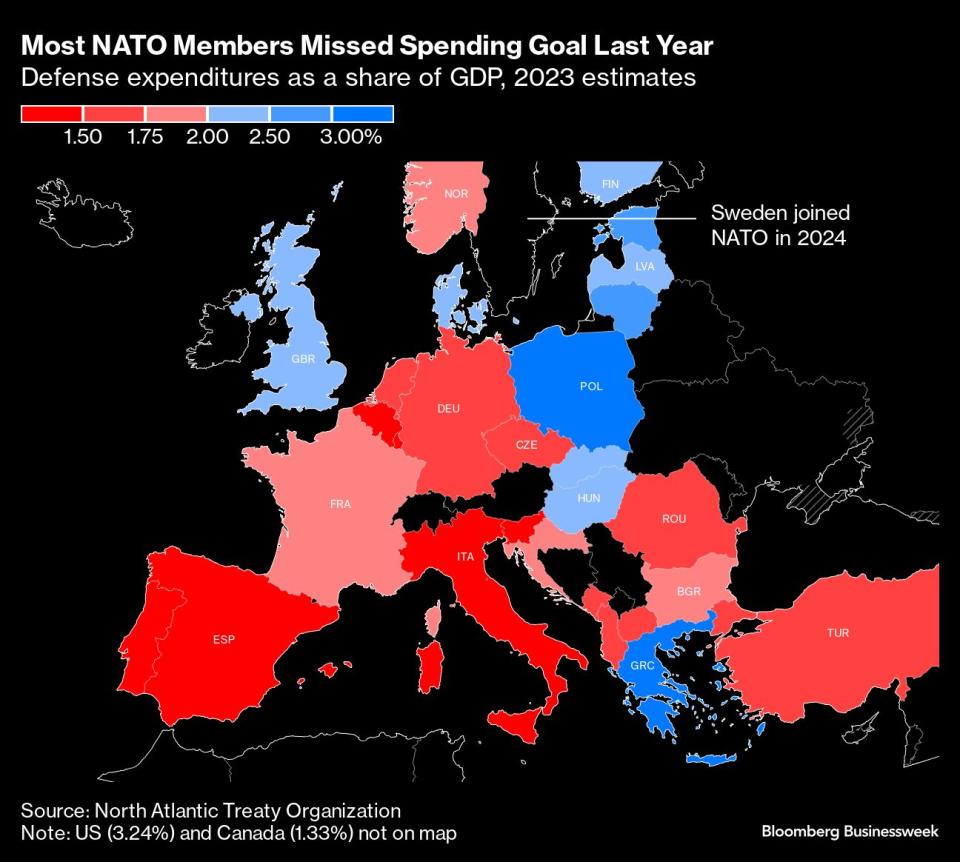Germany Needs More Debt to Meet NATO Goal, Scholz’s Party Says
- Oops!Something went wrong.Please try again later.
(Bloomberg) -- Germany will have to loosen its debt restrictions if it wants to maintain defense spending above NATO’s target in coming years, according to the co-leader of Chancellor Olaf Scholz’s Social Democratic Party.
Most Read from Bloomberg
NY Gears Up to Seize Trump Westchester Assets If Fraud Fine Is Unpaid
Baltimore Wants to Sell Hundreds of Vacant Homes for $1 Each
Yemen’s Houthis Tell China, Russia Their Ships Won’t Be Targeted
Justice Department to Sue Apple for Antitrust Violations as Soon as Thursday
After Russia’s full-scale invasion of Ukraine, Scholz unveiled a €100 billion ($109 billion) special fund for the military and promised that Germany will meet the military alliance’s goal of spending at least 2% of gross domestic product on defense even after the fund is exhausted in 2027.
However, restrictions on net new borrowing, known as the debt brake, mean it’s unclear where the additional cash would come from.
“The debt brake prevents important investments in our future,” SPD Co-Chair Lars Klingbeil told Bloomberg.
“As the SPD, we are committed to a fundamental reform of the debt rules so that we can respond appropriately to the new challenges of the 21st century,” he added, outlining one of the key pledges in the party’s campaign for the next election due in the fall of next year.
Those challenges, he said, include “ensuring security on the one hand, but also a strong economy and a strong welfare state for the people. This is difficult to reconcile with the current debt rules.”
Under the mechanism now in place — created in the aftermath of the 2008 financial crisis — annual net new borrowing is limited to 0.35% of GDP, with exceptions only permitted to deal with natural disasters and other emergencies.
The rules are enshrined in Germany’s constitution and any push to change them would need the support of a two-thirds majority in parliament, making it highly unlikely in the current environment.
Friedrich Merz, the leader of the main opposition conservatives, has ruled it out, while the SPD’s fiscally hawkish Free Democrat coalition partners, under Finance Minister Christian Lindner, are also against it.
The Greens, the other party in the three-pronged ruling alliance, have a similar stance to the SPD. Economy Minister Robert Habeck, who is also the vice chancellor, on Wednesday reiterated his view that Germany can afford to borrow more because its debt to GDP ratio is relatively low at around 63%.
Read More: NATO Chief Urges Allies to Ramp Up Military Supplies to Ukraine
“Perhaps a joint approach with the opposition will allow for more pragmatism in the solution of problems,” Habeck said at the Europe 2024 forum in Berlin. Raising the debt ratio by one percentage point would equate to borrowing of about €40 billion, he added, arguing that it “makes no difference whether we have a debt ratio of 63% or 64%.”
Two thirds of the cash in special military fund have already been allocated, enabling Germany to meet NATO’s spending goal this year for the first time since it was agreed by the alliance’s defense ministers in 2006.
Merz, who is hoping to challenge Scholz for the chancellery in the 2025 vote, has categorically ruled out working together with the SPD to reform the borrowing restrictions.
Instead, he has proposed cutting welfare spending in order to keep defense spending permanently high while sticking to the existing debt rules.
Klingbeil said it’s important for the SPD to avoid a situation in which it has to explain to voters why the government is still spending billions of euros on support for Ukraine while at the same time cutting pensions, child benefit or investment in jobs and infrastructure.
“We will not accept that,” Klingbeil said. “We must not play off military support for Ukraine against our promise of a strong welfare state.”
--With assistance from Kamil Kowalcze and Natalia Drozdiak.
Most Read from Bloomberg Businessweek
Weight-Loss-Drug Users Pay Up for Help Ditching the Pricey Meds
Magnificent Seven? It’s More Like the Blazing Two and Tepid Five
Wall Street and Silicon Valley Elites Are Warming Up to Trump
©2024 Bloomberg L.P.





